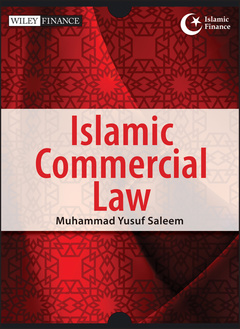Description
Islamic Commercial Law
Wiley Finance Series
Author: Saleem Muhammad Yusuf
Language: English
Subjects for Islamic Commercial Law:
224 p. · 18.2x24.6 cm · Paperback
Description
/li>Contents
/li>Biography
/li>
Filling a gap in the current literature, Islamic Commercial Law is the only book available that combines the theory and practice of Islamic commercial law in an English-language text. From the experts at the International Islamic University Malaysia, the book examines the source materials in the Qur'an and Hadith, and highlights the views and positions of leading schools of Islamic law, without burying the reader in juristic minutia. It combines theory with practice to address the needs of students while providing a pragmatic treatment of Islamic contracts. It provides diagrams for individual contracts to reveal the type and nature of the contractual relationships between parties and discusses all types of fundamental transactions, including sales, loans, debt transfers, partnerships, and more.
- Written by experts from the International Islamic University Malaysia, the leading organisation in research in Islamic finance
- Closes a vital gap in the English-language literature on Islamic commercial law
- Features end-of-chapter questions to enable self-testing and provoke critical thinking
An ideal guide for current students, researchers, and practitioners, Islamic Commercial Law offers a concise yet comprehensive coverage of the subject.
Preface xi
List of Abbreviations xiii
Acknowledgments xv
Introduction: An Overview of Prohibited Elements 1
Usury (Riba) 2
Ambiguities in a Contract (Gharar) 3
Gambling (Maysir) 4
Prohibited (Haram) Properties 5
1 The Contract of Sale (Bay’) 7
Introduction 8
The Pillars of a Sale Contract 9
Prohibited Sales and Practices 14
Contentious Sales 19
Chapter Questions 29
Notes 30
2 Types and Classifications of Sales 33
Introduction 34
Trust Sales (Buyu’ al-amanah) 35
Deferred Payment Sale (Bay’ Bi-thaman Aajil) 36
Islamic Banks and a Sale Contract 37
Future Commodity Sale (Bay’ al-Salam) 39
Manufacturing Sale (Bay’al-Istisna’) 43
Currency Exchange (Bay’ al-Sarf) 47
Chapter Questions 49
Notes 50
3 The Contracts of Employment and Lease (Ijarah),
Borrowing (I’arah), and Reward (Ja’alah) 51
Introduction 52
The Pillars of the Ijarah Contract 53
The Contract of Borrowing Things (al-I’arah) 60
The Contract of Reward for Service (al-Ja’alah) 61
Chapter Questions 64
Notes 65
4 The Contract of Agency (Wakalah) 67
Introduction 68
The Pillars of an Agency (Wakalah) Contract 69
The Types of Agency 70
Agency in Sale 71
Agency in Purchase 73
The Effects and the Rights and Liabilities of the Contracting Parties 74
An Agent Appointing Another Agent 75
Unauthorised Agency (al-Fadhalah) 76
Termination of an Agency 76
Chapter Questions 77
Notes 78
5 The Contract of Loan (al-Qard) 79
Introduction 80
Loan (Qard), Debt (Dayn), and Borrowing Things (I’arah) 81
A Loan That Provides Conditional Benefi t to the Lender 82
Waiting or Giving Time to a Borrower Is a Commendable Act 84
Chapter Questions 84
Notes 86
6 The Contract of Safekeeping (al-Wadi’ah) 87
Introduction 88
The Pillars of Wadi’ah Contracts 89
Relationship Between the Parties 89
When Is the Depository Held Liable? 90
Using Deposited Money for Investment 91
Wadi’ah and Islamic Banks 92
Termination of Wadi’ah 92
The Differences Between the Contracts of Wadi’ah and Qard 93
Chapter Questions 93
Notes 94
7 Partnership (al-Sharikat) 95
Introduction 96
Division of al-Sharikat 96
Capital Partnerships (Sharikat al-Amwal) 98
Management of Partnership (Sharikat al-’Inan) 101
Partnership of Services (Sharikat al-a’mal) 101
Partnership of Reputation or Creditworthiness (Sharikat al-Wujuh) 102
Partnership (Sharikat al-’Inan/Musharakah) and Islamic Banks 104
Dissolution of Partnership 106
Chapter Questions 107
Notes 109
8 Silent Partnership (Mudarabah/Qirad) 111
Introduction 112
Pillars of Mudarabah Contract 113
The Status of Sahib al-mal and Mudarib 114
Distribution of Profit and Treatment of Losses 114
Types of Mudarabah 115
Personal Expenses of the Mudarib 116
What the Mudarib Cannot Do 117
Void Mudarabah 117
Termination of Mudarabah 118
The Differences Between Musharakah and Mudarabah 119
Chapter Questions 119
Notes 121
9 Pledge, Mortgage, or Pawn (al-Rahn) 123
Introduction 124
The Pillars of Pledge (Rahn) 125
The Use of the Pledge by the Pledgee 126
Forfeiture of the Pledged Property 127
Chapter Questions 128
Notes 128
10 Guarantee (al-Kafalah) 129
Introduction 130
Pillars of Kafalah 131
The Effects of Kafalah 132
Immediate, Conditional, and Suspended Kafalah 132
Types of Kafalah 132
Charging a Fee for the Service of Guarantee 133
Letter of Guarantee 134
Termination of Kafalah 134
Chapter Questions 135
Notes 136
11 Transfer of Debt (al-Hawalah) 137
Introduction 138
Pillars of Hawalah 140
Types of Hawalah 140
Transfer of Right (Hawalat al-Haqq) 141
Bill of Exchange (Suftaja) 141
Termination of Hawalah 142
The Differences Between Hawalah and Kafalah 142
The Difference Between Hawalah and the Sale of Debt (Bay’ al-Dayn) 143
Chapter Questions 143
Notes 144
12 The Contracts of Absolution (al-Ibra) and Set-Off (al-Muqassah) 145
Introduction 146
The Subject-Matter of Ibra 146
The Pillars of Ibra 147
Types of Ibra 149
The Effect of an Ibra 149
The Differences Between Absolution (Ibra) and Gift (Hibah) 150
The Contract of Set-Off (al-Muqassah) 150
Classification of Muqassah 150
Chapter Questions 152
Notes 153
Answers to True/False Questions 155
Bibliography 161
About the Author 165
Index 167




